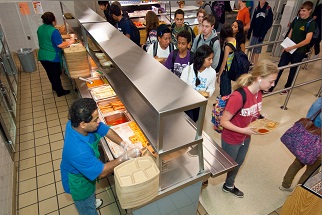National School Lunch Week (NSLW) is a celebration of the federal National School Lunch Program, which provides nearly 30 million children a nutritious meal each school day.
NSLW2025 will be observed from October 13 – 17.
Join FRAC Monday through Friday for opportunities to:
-
- promote the benefits and importance of school lunch;
- share best practices for increasing student participation; and
- advocate against SNAP cuts that may hinder children’s access to free school meals.
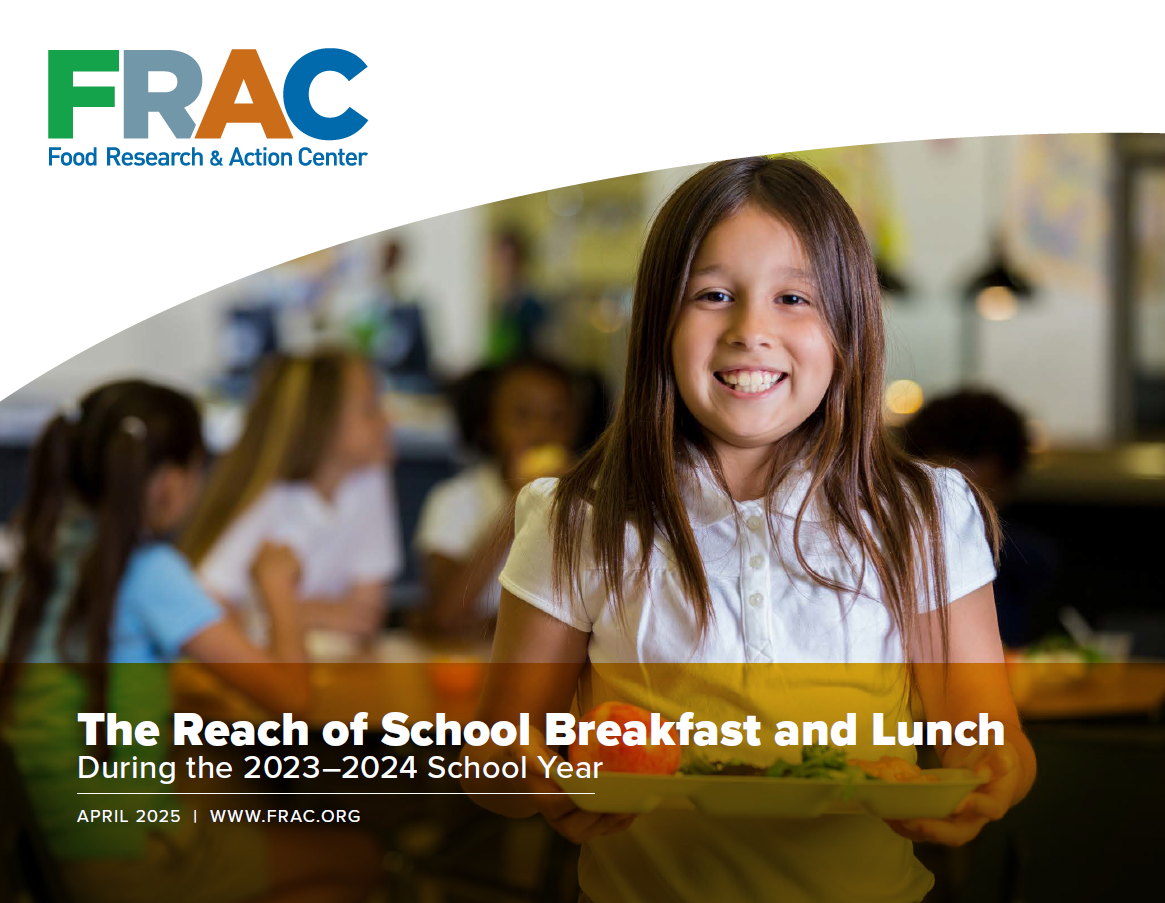
Read FRAC’s Latest School Meals Report
Offering school meals to all students at no charge leads to more students participating in school breakfast and lunch, according to FRAC’s The Reach of School Breakfast and Lunch During the 2023–2024 School Year.
Menu of Activities During National School Lunch Week 2025
Join FRAC every day for activities to increase awareness of school lunch and the nutrition it provides to millions of children.
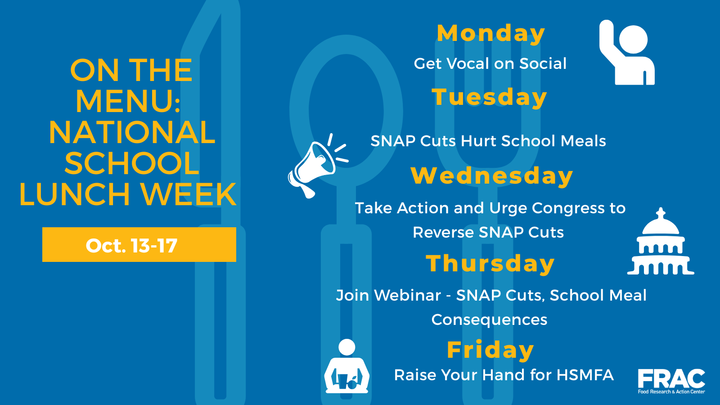
- Monday, October 13: Get Vocal on Social
Tag and tell your Members of Congress that we need nationwide Healthy School Meals for All! Use FRAC’s digital media toolkit to show your support. - Tuesday, October 14: SNAP Cuts Hurt School Meals
Read and share FRAC’s upcoming blog. - Wednesday, October 15: Take Action and Urge Congress to Reverse SNAP Cuts
Congress must take immediate action to reverse the devastating cuts on the Supplemental Nutrition Assistance Program (SNAP), which will have ripple effects for school meals. Use the FRAC Action Network to send a pre-populated email to your Members of Congress in a single click. - Thursday, October 17: Join Webinar – SNAP Cuts, School Meal Consequences
Join FRAC’s webinar, SNAP Cuts, School Meal Consequences: Protecting Community Eligibility and Children’s Access to Nutritious School Meals, at 3 p.m. ET. Register now. - Friday, October 18: Raise Your Hand for Healthy School Meals for All
Show your support for Healthy School Meals for All! Take a selfie raising your hand for #SchoolMeals4All and tag your Members of Congress. Be sure to tag @fractweets so that your message can be retweeted.
Historic SNAP Cuts Threaten Healthy School Meals for All Momentum
Children can’t learn on an empty stomach. School meals fight food insecurity, while supporting children’s health and learning. Offering school meals to all students at no charge, regardless of household income – Healthy School Meals for All – ensures all students have the nutrition they need to learn and thrive.
So far, nine states are implementing Healthy School Meals for All policies. Learn more about Healthy School Meals for All.
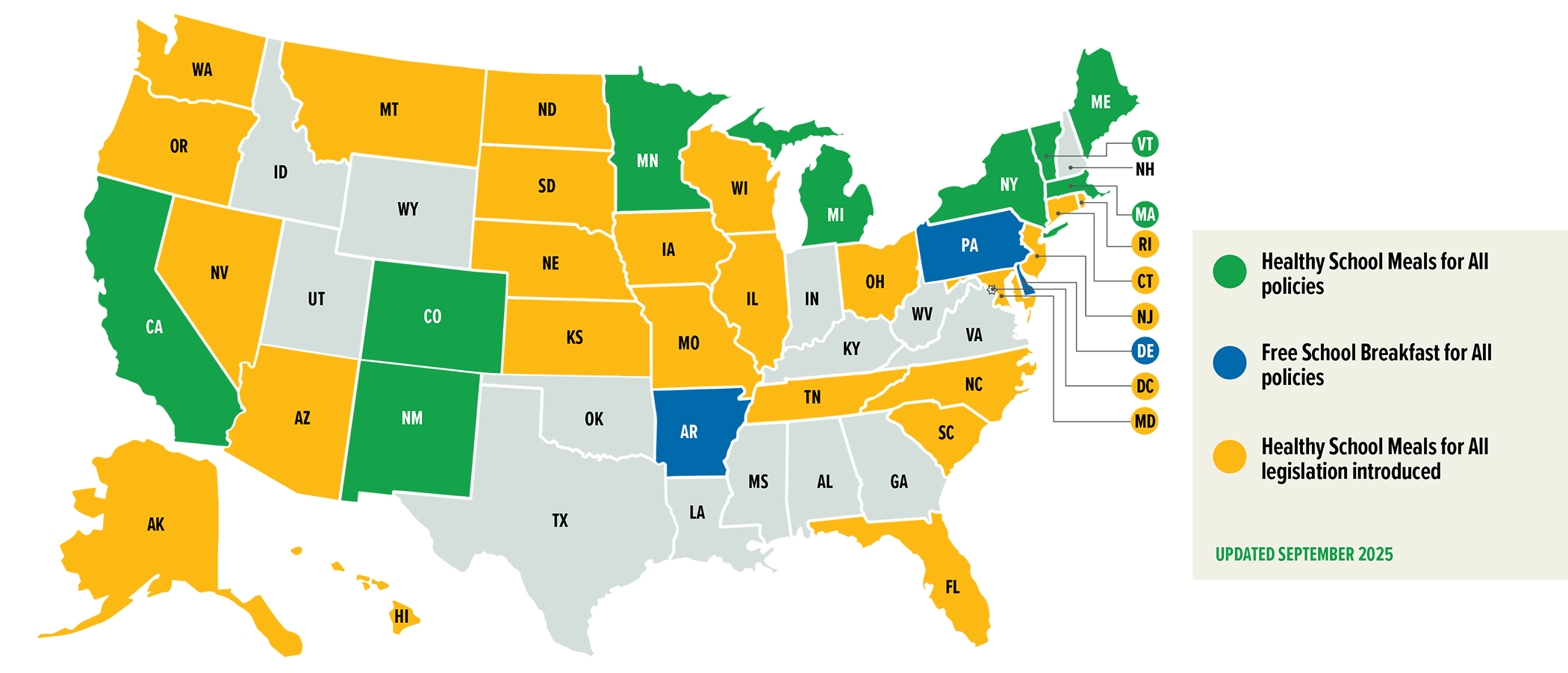

Spotlight on the Community Eligibility Provision (CEP)
CEP allows high-poverty schools and districts to provide breakfast and lunch at no charge to all students. Expanding access to free school meals through CEP is a key pathway to Healthy School Meals for All.

Expanding CEP ensures that more children across the country can access the nutritious meals they need to thrive — without stigma.
However, the progress made in CEP adoption over the past decade is now at risk.
The recently enacted budget reconciliation law (H.R. 1) includes historic cuts to SNAP. These cuts will reduce children’s participation in SNAP, severing their direct access to free school meals, undermining schools’ ability to implement CEP, and jeopardizing state efforts to fund initiatives like Healthy School Meals for All.
Now is the time to build on our progress, not tear it down.
Protect School Meals: Urge Congress to Repeal Historic SNAP Cuts
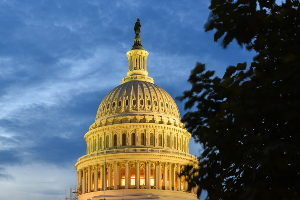
Urge Congress to Repeal Historic SNAP Cuts
When children lose their SNAP benefits, they also lose their automatic eligibility for free school meals. Tell your Members of Congress to repeal the unprecedented SNAP cuts by using the FRAC Action Network to send a pre-populated email with a single click.
Research & Resources

- National School Lunch Week Digital Media Toolkit
- New Blog Post: This National School Lunch Week, Protect Healthy School Meals for All
- Healthy School Meals for All – Campaign Site
- Community Eligibility Landing Page
- Benefits of School Lunch
- School Meals are Essential for Student Health and Learning
- The Connections Between Food Insecurity, the Federal Nutrition Programs, and Student Behavior
- School District Strategies for Improving Direct Certification
